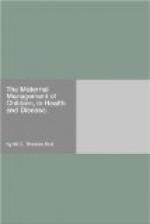Crying, mental irritation, or opposition, frequently bring on a fit; and even the sight of another in a paroxysm will induce it in those affected by the disease. Running or other active exercise will generally cause the fits to be more severe. Young children, too, must be carefully watched at night, and be raised up by the nurse as soon as the fit is threatened. These hints the mother should bear in mind.
So much for the simple form of the disease, and that in which it most frequently and commonly presents itself to our notice: a mild disease; and, if carefully managed and watched over, certainly not a dangerous one.
Of what, then, is a parent to be afraid, or against what is she to guard? Lest other disease insidiously come on, and advance to an irremediable degree, masked by the cough, without attracting her attention. This is the great source of danger in hooping-cough. The physician, in a case of simple hooping-cough, is not in daily attendance upon his patient, and therefore not present to notice the commencement or first symptoms of those diseases which so frequently occur at this time, and the successful treatment of which will mainly depend upon their early detection, and the decision with which they are treated. When you hear of a child or several children in a family dying of hooping-cough, it is not this disease which proves fatal; but death is caused by some disease of lungs or brain, which has been super-added to the hooping-cough. The progress of hooping-cough, then, must be closely attended to by the parent, even in the most favourable cases.
The most frequent complication with hooping-cough is inflammation of the air-tubes of the lungs. This is extremely frequent during spring and winter, especially in the months of February, March, and April, owing to the prevalence of easterly winds at this season. It is not my intention to detail the symptoms of this affection, only to point out those which will enable a parent to recognise its approach. A parent then may take warning, and fear the approach of mischief, when she observes the fits of coughing become more frequent and more distressing to the child, and the breathing hurried in the intervals of the paroxysm; when any exertion or speaking causes increased difficulty of breathing or panting; when the expectoration becomes less abundant, and difficult to get up; when there is no longer, or at all events less frequent, vomiting after the cough, and more or less febrile symptoms present.
If the lungs themselves are attacked by inflammation, most of the symptoms already pointed out will occur; the cough will be frequent, in short paroxysms; the vomiting will not take place; the breathing will be very quick and hurried; and as the disease advances the hoop will cease.




